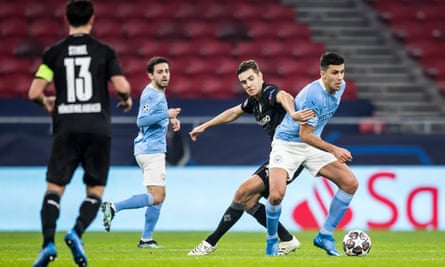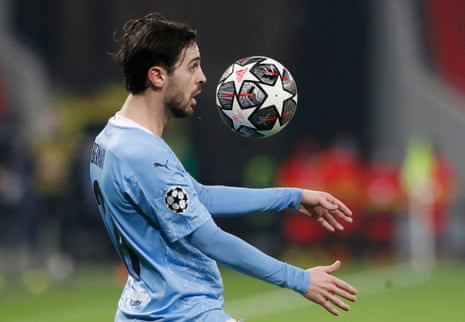The critical passage of this game, you felt, arrived around an hour in, when Borussia Mönchengladbach – 1-0 down and having just enjoyed a rare shot on goal – threw on two attacking players in attempt to wrestle back control. On came Marcus Thuram and Valentino Lazaro, jogging on to the pitch with vim and purpose, pointing in various directions for no reason, in the way that substitutes often do.
At which point, with Ederson in possession, Manchester City simply walked the ball up the pitch and scored. Ten passes in total, broken only by a desperate sliding clearance from the midfielder Florian Neuhaus by his own penalty spot. Then 16 more passes, ending with João Cancelo’s pinpoint diagonal, Bernardo Silva’s header across goal and the finish from Gabriel Jesus. Thuram and Lazaro had been on the pitch for two minutes. Neither of them had yet treated themselves to a touch of the ball.
This, perhaps, was the perfect distillation of City in the early part of 2021: a team fuelled entirely by their own volition, a team who ultimately don’t care if you’re there or not, a team playing a game that doesn’t really require you to participate. Here, Marco Rose’s side were essentially treated as ball-feeders, shadow runners: choreographed patsies whose sole purpose was to make City look like they were trying.
Perhaps we should have expected nothing less from a meeting between the best team in the Premier League and the eighth-best team in the Bundesliga.
But even in City’s mesmerising dominance there was an element of this display that felt partly acquiescent: a sense that at least in part Gladbach were simply hypnotised into compliance. City attack builds. City attack threatens. City attack breaks down. Here, City: have the ball back and try again.
Thus did City cruise their way to a 12th consecutive away win, a record for an English top-flight team in all competitions. At which point we should probably point out that both teams were playing away from home here. And as such, with no crowd and even the familiar comforts of Borussia Park left behind, perhaps Gladbach simply reasoned that an empty Puskas Arena in Budapest may as well be an empty Etihad Stadium in Manchester, only at one of them your away goals count for extra.
In part, the idiocy of Uefa’s adherence to the away goals rule in the Covid era explains Gladbach’s caution here: the conservatism of a team minded only to avoid a trouncing. And granted, there are any number of scorelines in Manchester that would still see them progress. But in order to do so, they will need to display the sort of ambition and bravery on the ball that was so lacking here.
From the start, City’s high press swaddled Gladbach like a baby, forcing the ball-player to take the path of least resistance: inevitably back to Yann Sommer in goal, or a hopeless punt up the field to a light blue shirt. At which point, your problems really begin.

The trouble with trying to win the ball off City, you see, is that you don’t just have to win it once. Such is the intelligence and aggression with which they swarm around the ball in numbers that even when you get the foot in, force the error, they gather up the second ball and come again. And so winning the ball off City really means winning it three or four times, by which time you are not only disorganised and a bit tired, but now surrounded by City players.
In the face of this onslaught, Gladbach simply disintegrated like a malfunctioning Wallace and Gromit contraption: players passing to teammates who weren’t there, players tripping over themselves, players dribbling the ball sideways, players making inexplicable errors. City’s first goal resulted from just such an implosion: two mistakes in quick succession from Christoph Kramer – a World Cup winner with Germany in 2014 – presenting the ball to Cancelo, who crossed for Silva to score.
Briefly, fleetingly, Gladbach threatened. But the chances were just too slight, too rare for a team who you sensed deep down just didn’t believe they were good enough. And yes, City have an expensively assembled squad, a fine manager, a well-drilled system. But for a team who were basically in disarray three months ago, none of this was inevitable. What Pep Guardiola has done is to restore not just City’s principles and philosophy, but the aura too: the immeasurable assurance and control that makes opposition teams do stupid things.
We have been here before, of course: Dynamo Kyiv in 2016 and Basel in 2018 and Schalke in 2019, imperious knockout performances that presaged disappointment. But what we can say with confidence is that Gladbach do not have the tools to trouble them. Perhaps the only side left who can still derail City’s Champions League dream is City themselves.

Comments (…)
Sign in or create your Guardian account to join the discussion